The Highs and Lows of Transitioning: An Interview with Lottoland’s Sophie Wood
Interviews
To mark Trans Awareness Week, Lottoland’s Learning & Development Partner Sophie Wood shares the highs and lows of her transition journey with myGwork, and provides sound advice on how workplaces and colleagues can be supportive allies.
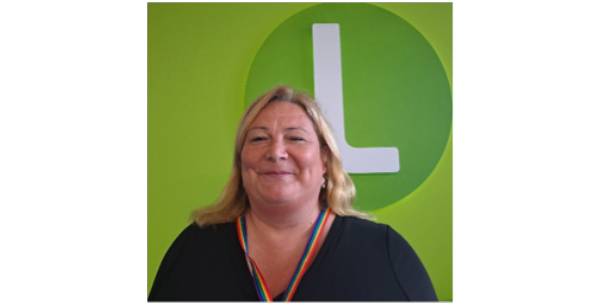
Hi Sophie, can you tell us about yourself, your current role, and your career so far?
I originate from a market town in Shropshire called Much Wenlock, which is acknowledged to be the birthplace of the modern Olympic games. My first permanent job after University was with the Royal School for the Blind, where I worked with adults with a visual impairment. After some wilderness years in Life assurance and Pensions, I joined West Mercia Police in 2004. After managing the Police National Computer Bureau for three years, I moved into Learning & Development where I trained Police Officer and Staff in National Intelligence Systems, Intelligence collection and Investigation. I then moved to Spain and worked in Gibraltar for Entain, 888, Entain again, and now Lottoland.
Can you share your trans journey with us?
When I was very young, probably at the age when you start primary school, I used to imagine that I was a girl instead of a boy. These thoughts filled my head on every journey to and from school and every walk to school until I left and went to university. I was born in 1972, so my decade for school life was the 1980s. I mention this because this was a time before the internet and social media. It was a time when being gay was demonised, vilified and routinely mocked. Being trans or transgender did not exist for me or for the majority. These were the values of British society at that time. The likes of Bronski Beat, Soft Cell, etc were just hitting the charts, it is a time well-referenced in Pride – the movie about LGSM and Mark Ashton. But that was not my world.
I instinctively knew that wishing to be a female was not something that could ever be spoken about. Like most children I ‘soaked up’ the views of my family, our friend groups, school mates, etc. Media at that time was just BBC1, BBC2 and ITV. For me there were no points of reference. I did not have the vocabulary to express myself, even if the opportunity would have afforded itself. At the age of 10, I began to wear my mother’s clothes in secret. When I was 11 my mum caught me wearing her red nail varnish. I was mortified... petrified, and said I had done it for a bet at school.
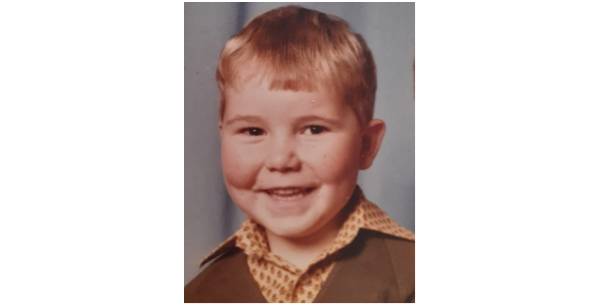
The next time my parents caught me ‘cross dressing’ was when I was 16, just before my exams. They had gone out for the evening and my brother was away, so I dressed up and went for a walk around the school grounds (we lived next door to my school). I returned home to my parents who had unexpectedly returned early. So we had a very uncomfortable confrontation. They were very upset; I was very upset. My dad (ex-policeman, now coroner's officer) told me if I had been ‘caught’ when I was out, I would have been arrested for gross indecency; and for being a pervert. My mum kept asking me why I did it; did I want to be a girl? But there was a genuine shrill horror in her voice which I could not endure so I said it was just my way to get a girlfriend. I told her that I did not know any girls, (as I was at a boy’s school) and the closest I could get to one was trying to look and be like a girl ‘in the mirror’. It was a horrible night and was never spoken of again.
Within two weeks I had met my first girlfriend, thus providing reassurance of my normality. My brother had no knowledge of this incident at all. Every moment I had alone between the age of 11 and 39, I ‘cross dressed’. This was the vocabulary ‘of my time’ which was less toxic than the term transvestite. So it was pretty amazing that through growing up in my family home, going to university, living in work accommodation, and living with my wife in our home, this was the only time I had ever been ‘caught out’.
In my mid to late 30s, I had begun to experience clinical depression which I could not explain. I was very happily married, had great relationships with my parents and my brother and his new family. Work was great. We had a great group of friends, yet I was starting to feel very low and dark in spirit and had started to self-harm – hitting my head frequently, burning myself with lighters and cigarettes, etc. All of that led me to see a psychologist, and it was through working with her for almost two years I had the first conscious realisation that I was transgender; and my subconscious and conscious denial of this was the cause of my mental deterioration. At this time, I was working for the UK Police service as a training manager. When I came out as Sophie, I was working for the Home Office and College of Policing on a national Intelligence Training Project.
I was very scared at the time that I would lose everything when I came out; my job, my family, my friends, my marriage, my community, my home. I was so horribly afraid. My hands are shaking and tears are streaming down my face at revisiting those emotions, as I remember this. To cut a long story short, I kept my job and my marriage (after 18 months of separation) and two friends.
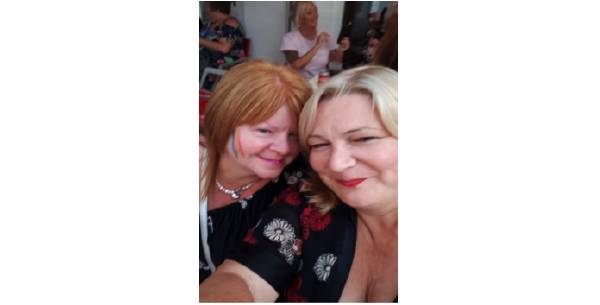
The next phase of my life, I speak about in a podcast I did for my previous employer Entain. You can listen to that on Spotify here. I discuss my trans journey at work, mentioning a few highlights, although it is a fraction of my story. If I continue to write this, it would be a book. So in the interests of brevity, I’ll pause my story here.
What’s the best thing about being trans?
The best thing about being trans is that before I came out, I had all the trappings of what most people would consider to be a happy, contented, and successful life, but I was hiding the blackest of dark hearts. After I came out, I have been treated as ‘other’, less than human, humiliated, denigrated, demonised, questioned on the validity of my actually being, but I have an inner light inside of me, which shines out of me when interacting with the world around me. I know I can take anything life has in store for me as I am bright and strong in more core spirit.
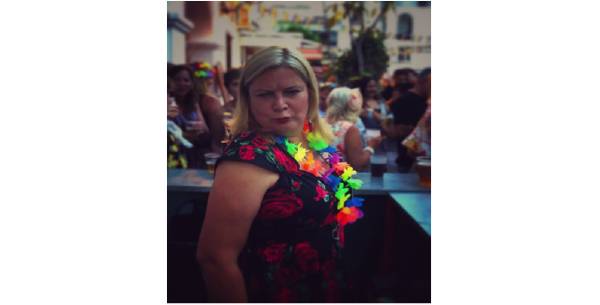
Have you got some favourite moments of your trans journey that you’d like to share?
My favourite moments for me have been the amazing trans and non-binary people I have met along the way. 3 people stand out for me in terms of either supporting me, inspiring me or challenging my thinking and views. They are Jacqui Gavin (a TLC Lion & British Vault), Bee Bailey (Gloucestershire Police) and Al Smith (West Midlands Police).
What was the most challenging aspect of the journey personally, and at work?
The most challenging aspect of my journey has been coming to terms with the loss of communication and relationship with my brother and parents. When I came out to them my mother wrote to me to say they would never be able to accept me. I speak about this when I am training others in this subject area. It is good for me to do this, but it hurts very deeply to think about. As you may have gathered from the early part of my journey, I have a protective mechanism of blocking things out pretty effectively. I acknowledge this is damaging to me so actually having the opportunity to speak it all out loud to others is a good thing.
How supportive were your colleagues and employer, both during the transition, and after?
My employer at the time of my coming out was West Mercia Police. They were brilliant overall. My colleagues in training school at HQ were truly wonderful. I feel like they came on my journey in the early days with me. My workplace was a safe haven from the more horrible experiences I was having in my local community, relationships, suicide attempts and just dealing with the NHS.
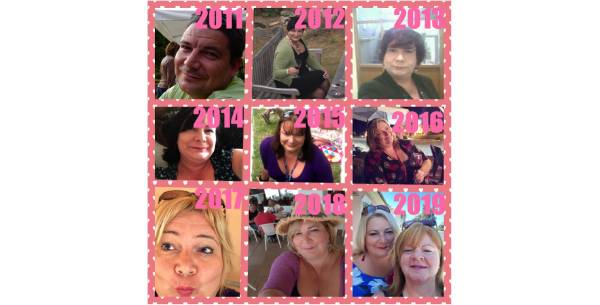
Does your employer currently have any initiatives to promote trans awareness at work?
My current employer is Lottoland. I am leading Diversity and Inclusion here, so the answer is whatever I can come up with. It will be fun and engaging I am sure. I feel like the luckiest girl alive to have Leah Carnegie (Chief People Officer) as my boss. I am Learning & Development Partner who is responsible for leading our Diversity & Inclusion strategy. For the first time in my working life, I truly feel trusted, respected, and empowered to bring my self and my experiences / learnings into the company. It is very early days, but I currently feel amazed that this is what work can actually feel like in terms of being rewarding, and genuinely loving it. This is down to Leah and the culture she has created at Lottoland. She has been described to me as Lottoland’s ‘secret sauce’. All I know is that I have been working with her for less than five months and she is unlocking the potential that all of my former teachers, and managers often thought was there, but never manifested.
In your opinion, what can organisations and allies do to better support trans staff and trans awareness?
Policies are often the thing people think about in terms of helping trans people to thrive and succeed at work. They do have a place and are more valuable in larger organisations. They can communicate a commitment to trans people to come and join the organisation for example. The reality of my work experience so far, is that it is the culture of the organisation that is key. It is the behaviours that are lived below the line of company values that make the real difference. I had that positive behavioural experience at West Mercia Police HQ Training School, in Customer Services at what was then Gala Coral, and now happily at Lottoland.
What advice do you have for working individuals considering or going through a transition journey?
My advice would be to prepare well. I dived straight into my new life as an act of emergency. I know others who have taken their time, organised their finances, relationships and employers etc; and they have had very positive experiences. Also use the many great networks and role models out there. The key benefit of the rise of social media for trans people is providing connections, education and peoples’ stories. Although it competes against the many evils, social media and the internet can be used for help and guidance. I would have loved to transitioned in these times as a young person, so if you are that young person – don’t look back.
Is there a particular charity you would recommend to get advice/support from?
In terms of charities, for supporting trans children in the UK I highly recommend Mermaids who do a fantastic job. For anyone who wants to support and be educated around trans and non-binary identities in Europe then I highly recommend mission TGEU; an organisation on a mission to strengthen the rights and wellbeing of trans people in Europe and Central Asia.
Throughout Trans Awareness Week, myGwork is featuring many individual stories of people sharing their trans journey, as well as advice on transitioning safely, so don't forget to check back in. myGwork is also marking Trans Day of Remembrance this year by hosting a panel geared entirely towards transgender empowerment and visibility.
Joining us on the panel will be trans employees and allies from across various industries, discussing their experiences, offering unique perspectives and acknowledging the importance of trans visibility. Speaking on the panel is Georgina Partington (Software Developer at Valtech), Alexandra Austin (Diversity Inclusion and Wellbeing Partner at Brewin Dolphin), Brae DeRocher (Senior Project Manager at FIS), Megan Steven (Human Rights Defender at None), Kevin Lyons (Senior Humans Resources Manager at Pearson) and Liam Paschall (Associate Director at Parexel International). The panelists will give their thoughts on how to lift the voices of the trans community, and what constitutes being a good ally.

